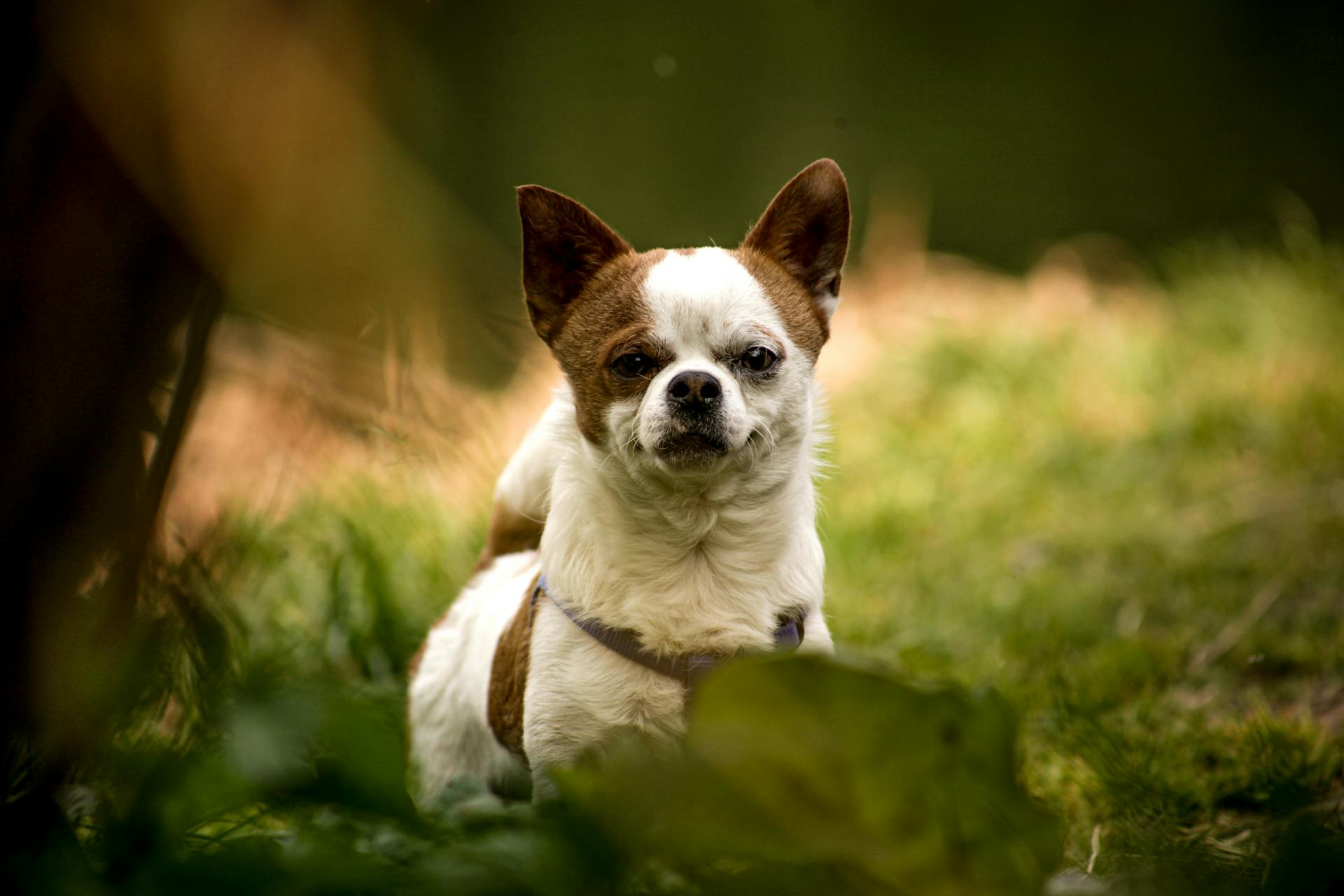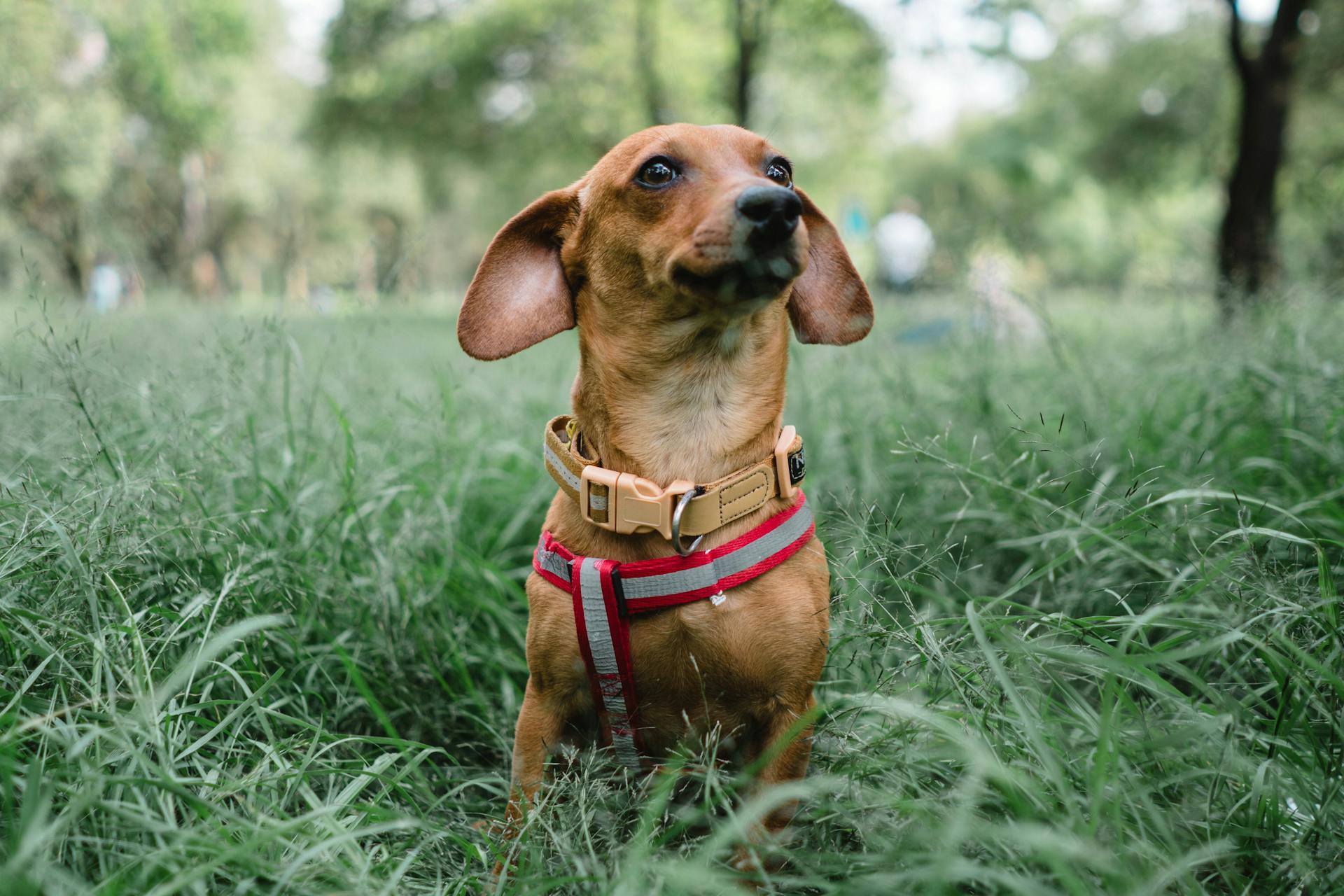
Chihuahuas can become aggressive to other dogs due to various reasons, including genetic predisposition, socialization issues, and fear-based aggression.
Some Chihuahuas may inherit fear-based aggression from their parents, which can be triggered by the presence of other dogs.
If a Chihuahua is not properly socialized, it may develop fear-based aggression towards other dogs.
Proper socialization is crucial to prevent aggression in Chihuahuas.
A Chihuahua's small size can make it feel vulnerable around larger dogs, leading to aggression.
A Chihuahua's owner should be aware of its body language, such as raised hackles or growling, which can indicate aggression.
For your interest: Dog Fear Aggression Training
Understanding Dog Aggression
Dog aggression is a complex issue that can arise from various factors. Aggression can be adaptive or normal in certain contexts, such as when a dog defends itself or its family. However, in many cases, aggression is a result of underlying issues like fear, anxiety, or frustration.
Aggression can be caused by fear, which is the most common motivator for aggressive behavior in dogs. This fear can stem from various sources, including past experiences, lack of socialization, or even a previous bad encounter. A study in Finland found that older dogs, male dogs, small dogs, and dogs that lacked the company of other dogs showed an increased probability of aggression toward people.
Here's an interesting read: How to Socialize a Dog with Fear Aggression
Dogs can also become aggressive due to resource guarding, territorial protection, or protective instincts. For example, a mother dog may become overly protective of her puppies, while a dog may defend its food or toys from other dogs. A dog's breed, age, size, and home dynamic can also influence its aggression levels.
Reactive dogs, which are dogs that respond to normal situations with abnormal levels of arousal, can become aggressive if they're not addressed. Reactive dogs may exhibit behaviors like barking, lunging, or cowering in response to triggers like strangers or other dogs. If left unchecked, these behaviors can escalate into defensive aggression.
Here are some common causes of dog aggression:
- Fear-based aggression
- Resource guarding
- Territorial protection
- Protective instincts
- Pain aggression
Understanding the underlying causes of aggression is crucial in addressing the issue. By recognizing the triggers and motivations behind aggressive behavior, dog owners can take steps to prevent and manage aggression. This may involve training, socialization, and behavioral modification, as well as addressing any underlying medical issues.
Correcting Social Aggression
Correcting social aggression in Chihuahuas requires a deep understanding of canine behavior and body language.
Dogs are social animals and live in groups, but in a free-ranging situation, they would choose which group to live in and leave those where they are not welcome. Assessing the level of the threat and the potential for safety is the first step in determining the prognosis at least in the short term.
Some dogs will simply never be friends, and in such cases, it may be too dangerous to allow them to be housed together. Identifying specific triggers or situations in which problems might arise can provide a viable opportunity to prevent and possibly improve the aggression.
Dogs that threaten but do not cause injury may learn to communicate in a way that avoids any further escalation to aggression, provided the owner does not intervene with normal communication and learning.
However, if the situations in which aggression might arise are infrequent but cannot be predicted and prevented, or if they lead to injury, then alternative housing may be required for one or more of the dogs. This is especially true if the dogs are of different sizes or have health differences, or if one or both pets exhibit overly intensive responses.
Managing Dog Interactions
Managing dog interactions is crucial when dealing with a chihuahua aggressive to other dogs. Dog reactivity is a common issue where dogs respond to normal situations with abnormal levels of arousal, leading to intense behaviors like barking, lunging, and cowering.
To prevent reactivity, socialization is key. Socialize your chihuahua to as many situations and people as possible, and positively expose them to various environments. This will help them develop good emotional control.
However, if your chihuahua has already developed reactivity, there are no quick fixes. An owner's participation, consistency, and follow-through play a critical role in a successful behavior modification plan.
Here's a three-step program to manage dog interactions:
- Practice management by avoiding situations that emotionally arouse your dog, such as walking at night when it's quiet or staying away from busy parks.
- Begin a positive-reinforcement training program, which may include behavior modification protocols like desensitization and counterconditioning or teaching your dog an incompatible behavior.
- Learn to read dog body language, such as lip-licking or pinning back the ears, to intervene before your dog becomes reactive.
If necessary, a fourth step may involve medication to calm your dog and make them more receptive to learning new behavior patterns. By following this program, your chihuahua will form new emotional associations with their triggers and their reactivity will diminish.
Take a look at this: Will Neutering Stop Dog Aggression
Training and Rewarding
Training and Rewarding your Chihuahua is key to helping them overcome aggressive behavior towards other dogs.
Start by rewarding your Chihuahua with praise and treats for behaving positively in a situation that previously made them anxious or aggressive. This will help them associate good behavior with positive outcomes.
Increase your Chihuahua's experiences, exposing them to new sights, sounds, and places slowly, at a pace that is comfortable for them.
Preventing Aggression
A reactive Chihuahua is more likely to behave instinctively with fight, flight, or freeze than to consider their actions, making them at high risk of acting aggressively.
Reactivity puts a dog at risk of acting aggressively because they're in a heightened emotional state which shuts down the thinking parts of the brain.
To prevent aggression, it's essential to address reactivity first. This means teaching your Chihuahua to calm down and respond to calm stimuli, rather than reacting impulsively.
Reactive dogs can learn that aggression gets results, so it's crucial to avoid reinforcing anxiety and aggression by soothing your dog when they're behaving aggressively.
For more insights, see: Reactivity Dog Training near Me
Don't pick up or hold your dog close when they're acting anxious or aggressive, as this can reinforce their behavior.
The goal of reactive behavior is often to increase the distance between the dog and the perceived threat, so it's essential to teach your Chihuahua alternative ways to cope with anxiety and stress.
A reactive dog's behavior can morph into defensive aggression over time, especially if they've repeatedly tried to create distance and failed.
A fresh viewpoint: Dog Reactive Dog Training
Sources
- https://www.akc.org/expert-advice/training/reactivity-vs-aggression/
- https://vcahospitals.com/know-your-pet/dog-behavior-problems-aggression-sibling-rivalry-treatment
- https://ilovemychi.com/walking-your-dog-aggressive-chihuahua/
- https://wagwalking.com/training/not-be-aggressive
- https://www.chihuahuapuppytraining.com/chihuahua-aggression-toward-other-dogs/
Featured Images: pexels.com


